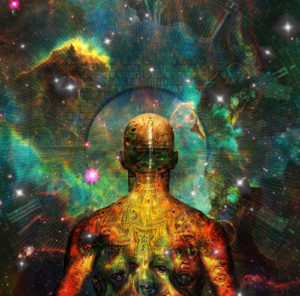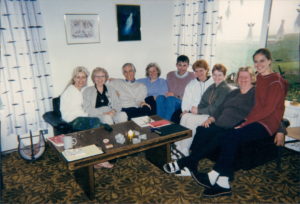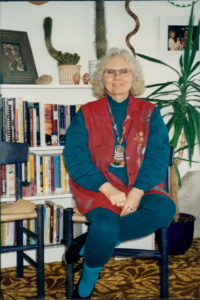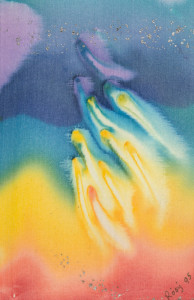Dream Seminar
July 19, 1997
Leidarljos, Brekkubae, Iceland
The Unfoldment of the Play
…”every dream is a unique and spontaneous creation of the psyche, and the psyche is capable of using anything to mean anything.” (John A. Sanford)
A dream calls you into your life.
What to look for!
•The scene – Clues to the present inner environment of your psyche. What attitudes stand out?
•Note any sense of time the dream emphasizes, or a time you are reminded of.
•Note the emotional tone, feelings about the environment, particular buildings/structures. Are there immediate personal associations? What comes to mind?
•Who is on stage and what is actually happening – remember, this will be a representation of some aspect of your life or truth within an archetype and therefore, within mankind’s story– all the players are aspects of yourself – be they male, female, child, flower or stone.
•Does there seem to be a general focus or motif?
If one chooses to attend a play, you are interested and came to see and be affected in some way. One has chosen to be present and to see what is. When a similar attitude exists towards the dream, and you are able to see what is going on without any moral intentions or judgments, trusting that everything in the dream is ultimately there to bring healing to one’s soul, one can be instructed, one can befriend the loathsome and the unlovable and one can build compassion for one’s own pilgrimage on this earth.
There is a common term you may be familiar with in relation to “observing the play within” – and that is, Inner Work (Robert Johnson). In Inner Work, we witness, we attend to what has arisen spontaneously, we pay attention to our own mystery, attend to our own individual evolutionary contracts and to the unique wisdom given to us.
Here, God’s ground is my ground and my ground is God’s ground – a quote from the 13th century mystic, Meister Eckhart. In the dream, the Divine and the human share space.
Eckhart is even more specific – “The need to find God is more pressing than the need for food, drink, clothing, or comfort.”
In doing Inner Work we are reaching for the “utterly dependable Divine Core.” (Bellhouse). A door is opened to a tolerance of, and an evolving ordering of our life, and we are invited to live patient excitement as we receive necessary, homeopathic doses of the suffering, guilt and shame of Self-betrayal, (consider Hamlet to his mother – “Oh Shame, where is Thy bloom?”) along with the seeds and nourishment for the blossoming of a Life, cherished and fully lived.
Some Definitions
Archetype – remember, in the beginning we considered who was on stage – some figures particularly stand out as “numinous,” unearthly, foreign, typical, or very prominent and noticeable.
An archetype is a typical, ancient human pattern of the soul’s journey in the world. It is likened to a psychic organ, not unlike our physical organic structure. It is a major vortex or complex energy presenting itself though an image, recognizable to all people – in other words, it is typical of all human experience – for example, Mother, Father, Child, Brother, Sister, Friend, Wise Old Man, Road, River, Tree – what have been your experiences ?
All archetypal energy has a positive, bright side and a negative, unfavorable aspect – Mother Nature brings Life and Creativity and Death and Dissolution —always the Paradox of the Opposites. Acknowledged or not, (like the Sun), it will have profound effects on our thoughts, feelings and actions. One is invited to eventually come to terms with it in some way through dialogue, ritual or ceremony. We are called to find our own unique creative expression of the images, emotions and ideas that arise—be it dance, poetry, music, acting, whatever creative expression you find is yours.
Specific Archetypes of the Dream
Shadow – this will be a figure of the same sex. in a dream. In the growing–up process, we work out our experiences towards what has become acceptable in us and to society —this will include what must be hidden –i.e. what is refused, and unacceptable —— however they stay in the computer, so to speak, collecting in the dark corners of our personality – the shadow is a highly charged complex or vortex of energy forms which is autonomous. The shadow is that within which contradicts the ego ideal . Whitmont describes a man who might say I’m a bum or I’m a King. It might become recognized as anger. weakness, primitive, crippled, rebellious, sensual, often what we are afraid of or do not wish to face. The experience/feeling or dream image might include positive attributes we have not been able to acknowledge about ourselves, such as our most outstanding traits and talents. If ignored, the Shadow can build in energy and literally create a life of its own, bursting through,  demanding space in our lives, announcing itself as rage or depression, or create an accident or illness that will be noticed – a geyser! Sanford suggests that in our intellectual, educated, sophisticated world of manners and morals, the Shadow is the neglected primitive man in us. No one is without a Shadow. With conscious recognition, he or she brings much positive value to us – earthiness, instinctually, zest for living and humility. Like Jacob, we are called to wrestle with our shadow and see the “beam that is in our own eye.”
demanding space in our lives, announcing itself as rage or depression, or create an accident or illness that will be noticed – a geyser! Sanford suggests that in our intellectual, educated, sophisticated world of manners and morals, the Shadow is the neglected primitive man in us. No one is without a Shadow. With conscious recognition, he or she brings much positive value to us – earthiness, instinctually, zest for living and humility. Like Jacob, we are called to wrestle with our shadow and see the “beam that is in our own eye.”
The Dream offers Shadow upkeep – remember, it is a living energy in you and will demand to be known. It actually cannot be ignored (it will be expressed in some way—mostly viewable through projection). It must never be considered harmless, for negative consequences can ensue with that attitude. We cannot just dispose of the dangerous, destructive aspects of ourselves, nor can we ignore the courage, strength, and dignity that hides there along side it– for, you see, the Shadow is closer to Nature, to the primitive man or woman, which will absolutely force us to admit our true resentments, where we are bored, what its passions and truths are. Its destructive energy can be the necessary clearing before creativity if the explosion is dosed correctly through ritual, ceremony, journey, meditation, or active imagination. (write, tear, move)
To recognize, own, and relate to one’s shadow is to reach the Central Holy Place. If we do not, we ask our partners, friends, children and the world to carry it for us.
The truth or balance point lies somewhere in the center. The psyche is designed to keep the shadow/ego balance – the polarity balance between Light and Dark. To make light is to make shadow.
Dream Ego – This is You in the dream – a particular you, that is – one who calls and invites you to willing work with the dream. You may be an  observer or you may be in active participation – take note about what you are doing and how you are relating in the dream. Either way, it will be leading you, possibly pressing you and certainly stretching you. It will invite you to your necessary sacrifices.
observer or you may be in active participation – take note about what you are doing and how you are relating in the dream. Either way, it will be leading you, possibly pressing you and certainly stretching you. It will invite you to your necessary sacrifices.
The Persona – This word comes from the masks worn by actors of old to establish the roles they were playing on the stage. So it is with us on the stage of life – we live certain roles – the social necessities of parent, teacher, banker, builder, counselor, etc., the part and parts we play every day in our world. The persona is designed and shaped to make a specific impression on other people and to hide our innermost self from others –—it has a purpose and it is needed. The danger, as with any archetype, is with Identification with the persona, believing you are the person you would like to appear to be. Such identification is rewarded in Western culture – usually in cash. The shadow stands in direct contrast – as Sanford states – “The more we try to appear all goodness and kindness, the more brutal our shadow appears in contrast; the more we try to be all strength and courage, the more we are followed by a shadow of weakness.”
would like to appear to be. Such identification is rewarded in Western culture – usually in cash. The shadow stands in direct contrast – as Sanford states – “The more we try to appear all goodness and kindness, the more brutal our shadow appears in contrast; the more we try to be all strength and courage, the more we are followed by a shadow of weakness.”
Anima and Animus – Here are the dream figures of the opposite sex, harder to feel, more difficult to access and relate to. Keep in mind that, like the shadow, they are trying to balance us towards the center through the movement of centroversion toward wholeness.
Once again, without attention or acknowledgement given to them, these energies can behave autonomously, as if they were a law unto themselves, interfering with and disturbing life. Anima and Animus try and do get your attention negatively with moods, gossip, erratic, inferior, unpredictable behavior and irrelevant conversation. My sense is that these energies get real irritated and negatively active with us when we don’t pay attention to them within our whole being.
Anima and Animus, however, have tremendous creative potential when consciously related to and attended to. They are the inner guides to the soul – the sea nymph and deep-sea diver that lead us to the possibility of co-creating with the Divine, the Nous. They know the way of and to your depths and offer the bridge to the unconscious. I can guarantee you that, like the shadow, they will be active, one way or the other.
In man, the feminine archetype is named the Anima – feminine characteristics separate from the masculine ego. She is the woman in man and may appear as individual women the man has known, or as feminine shapes, reflecting the universal archetype. This Inner She in the psychology of a man is the other half of his soul, an energy that animates and fills a man with the Life Force itself. She will inspire his strength, his delight, his meaning, his animation, his sense of worth and well-being, and his feeling of happiness. The man who ignores her will experience her wail, irritations and dark moods – all are her attempts to contact him, to wake him up to her holy gifts and qualities – her deepest wish is to inspire, encourage and bring the man into a deeply meaningful life. This may mean surprising new directions. Without this conscious contact with the Anima, a man may live at the mercy of his moods (for anima is nature itself with all its seasonal fluctuation) – thus, if she is not made an ally, she can steal his strength and power. Robert Johnson’s books, He and She and Lying with The Heavenly Woman, address these challenges beautifully. He states, “To hear the strange, exotic needs of one’s inner companion is pure genius in relationship.” Translated in relation, without this projection, the outer woman in a man’s life is freed to live her own structure— she is not and cannot be his Goddess.
If a man in his great hunger and need for the Divine Feminine does not open the windows to her, he will ask his partner in life to be this for him, setting the stage for tragedy, for he then fails to see her as the human being she is. Generally, the best solution is for a man to marry one facet of his anima, and live the rest in creative endeavor. This will require great discernment and differentiation.
The woman is balanced by her inner masculine, the Animus. This energy can be a harsh, ruthless, slave-driving dictator, full of idle talk, opinions, judgments, and nagging shoulds, both in relation to herself and others. This energy, unconsciously lived through the ego, will completely short-circuit a woman’s own true Mind, Body Soul alignment, interfering with her relationship to herself and others, forever putting her “Off the Mark.” This is called a state of animus possession, i.e. the animus has gotten between her and the world – the ego is taken over by the energy——it is no longer her true voice.
When acknowledged and related to consciously and with respect given, the Animus energy offers himself as an invaluable inner companion and servant – a noble prince, who gifts her with a deep source of strength and energy, with charisma, initiative, courage, objectivity and spiritual wisdom.
 The man in a woman’s dreams could be her father, husband, son, lover, healer, shaman, brother or a figure unknown– any number of possibilities. In literature, I am reminded of the classic figure, Heathcliff, in Wuthering Heights. He became Catherine’s initiation to the possibility of the profound inner mediator between the conscious and unconscious inner world, an essential helpmate at the inner level who can open one to personal spiritual life; however, he must not be confused with the outer man. Recognition of Animus power can bring forth a personal confrontation with inadequacy felt in the ego until the woman begins to name (see the story of Rumplestiltskin) his various facets, discriminating out his interests and needs, differentiating them from her feminine ego/Self. (Examples – scholar, wanderer, adventurer. Johnson’s classic book, She, tells woman’s story of this struggle in the myth of Psyche. Like the man, if a woman will marry one facet of her animus, and leave the rest to be lived in spiritual creativity and expression, she can then truly be the living lamp that only she can be.
The man in a woman’s dreams could be her father, husband, son, lover, healer, shaman, brother or a figure unknown– any number of possibilities. In literature, I am reminded of the classic figure, Heathcliff, in Wuthering Heights. He became Catherine’s initiation to the possibility of the profound inner mediator between the conscious and unconscious inner world, an essential helpmate at the inner level who can open one to personal spiritual life; however, he must not be confused with the outer man. Recognition of Animus power can bring forth a personal confrontation with inadequacy felt in the ego until the woman begins to name (see the story of Rumplestiltskin) his various facets, discriminating out his interests and needs, differentiating them from her feminine ego/Self. (Examples – scholar, wanderer, adventurer. Johnson’s classic book, She, tells woman’s story of this struggle in the myth of Psyche. Like the man, if a woman will marry one facet of her animus, and leave the rest to be lived in spiritual creativity and expression, she can then truly be the living lamp that only she can be.
The Archetype of the Self – This archetype is the furthest removed from the conscious mind. It is the urge , the seed to become what one is, a Birth Center. Hillman, in The Soul’s Code, describes this energy as “the energy of the centerpoint that arranges our lives – the inventor and organizer of our dream images, the writer and director of our drama.” How far one can go with their fullest development depends on whether or not the ego is willing to listen to and witness the messages. Here contact is offered with ultimate life creation or destruction. Self symbols, as with all archetypes, contain paradox – and symbols can vary from the abstract objective geometric symbols of the circle or square to animals, flowers, mountains, rivers, seeds, hidden treasure, Divine child, Gods and Goddesses, and the city. The psyche is the world—it will call you to your unique world and speak to you.
Any contact the ego has with the Self is an event – one feels this as numinous and recognizes the presence of an immortal energy operative in oneself. The awareness this brings is holy and full of mystery. It is joyous, momentous, releasing and burdensome. The ego is both glad and shocked to experience these opposites coming together. Once the ego is willing to witness, realize and acknowledge that it is not the one in charge in one’s psyche, true dialogue with the Divine can become possible. There is a big leap in consciousness here, forging the way to an ability to bear the cross of the union of opposites that exists in oneself for the sake of wholeness. Here it is that we are given more than we asked for or could imagine – the transpersonal has met the personal. 
So, you have met the players! How are we to respond? What can we do with the dream?
We began with the image of watching a play, of noting the environment, who is on stage and what is happening
▪Record as much as you can remember, including your feeling.
▪Befriend the dream – monitor your attitude—is it willing to befriend the dream?
▪Begin to make associations – personal and otherwise, i.e. let your imagination play with each image, especially noting any feelings or memories.
▪Every image is an energy complex with clues for you, be it person, situation, color, sound, word, idea, memory or feeling. Keep going back to the original image – to that “aha” and be sensitive to phrases that come to mind, such as “I’m flying high.” Go with what clicks to the association that holds energy for you.
▪Dealing with archetypal amplification – i.e., is there a numinous presence in the dream, an animal, a god or goddess, a reminder of a myth or fairy tale with a royal or divine quality? Let the story haunt you – find the story there. Keep in mind that every symbol in your dream belongs to you personally—it came to You! A personal response is required in relation to the archetype constellated in the symbol. Something is trying to evolve in your life. Ask, “What does this have to do with me?”
 Seeing the Action from Inner to Outer.
Seeing the Action from Inner to Outer.
What part of me is that? What is their attitude?
Where have I seen that functioning in my life lately?
Where is that feeling or attitude in my personality?
Who in me feels like that or behaves like that? For example, where is that sadness in me?
Remember – every dream will demonstrate either our effort to relate to the unknown in ourselves, or how we set up conflict with it to avoid hearing , seeing or feeling the messages.
We each live within a complete inner world – a village or whole city within. Most dreams are concerned with this world and your relationship to it, rather than with your relationship to the outer world.
It is common to jump first to the outer situation, but the fact is that everything will be a reflection of our inner state
Once in a while prophetic dreams will come. I would say that all dreams offer some preparation theme. Go first with the inner possibility.
Both man and woman must first address conflicts with the inner partner before they are discussed with the wife or husband.
If a man has a mother dream, that particular complex of energy includes the Great Mother, which offers the potential of supporting his power and accomplishments in a generative way.
If a woman has a dream that a man dies, she must consider the inner aspect of the masculine archetype separately from a particular person that may have died. i.e. who in me died, what qualities, et. may have died here.
Rule: “You will never find anything in the unconscious that will not be useful and good when it is made conscious.” (Johnson) You may be forced to meet a noble hero or heroine and will have to face these fine qualities in yourself.
It is worth pure gold to know what you are really up to.
Ask yourself, “Where have I seen myself doing that lately?”
If the figure is unknown, give them a name like Trickster, Brother John, Wise Mother, Tyrant, etc. and get acquainted with them as beings in their own right who live in your inner field. Allow them to describe themselves and learn from them directly.
The best test of your connection with the truth from the dream is whether your interpretation energizes you.
Let us carry this further: How to further tell if the interpretation is approaching truth:
Did you learn something you didn’t know?
Are you inspired to look at the unfinished business in your life?
Keep remembering – your dreams concern you 99.9% of the time.
Learn to live patiently with big dreams as blueprints for growth. Stay with the images. Stay with the tension.
Befriend all aspects of the dream.
Time will tell.
Who did you meet and what did you learn from each other?
With some understanding, what might correct action be?
Physically do something to strengthen the dream impact.
You may be called to an immediate change or specific behavior.
Reverently do a ritual or ceremony in honor of the dream.
Send a letter, or card; make a phone call; buy flowers; light a candle; take a walk and think about the dream——but honor the dream in some way.
Above all, do not use the dream as an excuse to act out.
Remember, all dreams will support your right to live who you really are.
Active Imagination
This is the special use of the power of Imagination – a dialogue you choose to enter with the many different parts of yourself, while you are awake.
One can talk to and interact with the image, allowing the energy to answer back – be open to this active exchange between the conscious and unconscious energy systems – the can be startling, offensive, delightful, surprising and enlightening.
One must participate fully – could have cold sweat or feel authentic terror, but the result of such a confrontation , eventually, is a deep sense of peace with the awareness that an agreement has been made for all within to be know, how they are to serve or not your wholeness—are they to thrive or die
It is best to tell someone in the beginning that you are going to do an active imagination and that you would appreciate them being available.
You may think—Did I just make this up? Keep in mind that whatever you “make up” comes from your unconscious!
You can go directly into the dream environment, or, some have special place in the “mind field” you go first to receive the dream – make a place for greatness. For some, it can be very helpful to have a set, orderly procedure or ritual, a certain chair etc.
Active imagination can also be experienced through writing, dancing, or playing music, painting or sculpting it is opening the door , an invitation for the unconscious to speak through us. If one part needs release, write, tear and/or burn.
You will eventually want to establish:
✓Who are you?
✓What do you want?
✓What do you have to say?
✓Extend the dream and bring it to resolution
✓Imagine living the dream differently.
Know that you will have feeling responses – you are in active participation, listening, responding and honoring all possibilities, what was frightening, what was dishonored, what was ecstatic, what was conflicting, etc. Never abdicate your rightful role – We are called to relate to our lives——come into relationship with these sometimes overwhelming, impersonal forces in your unconscious. We are Trustees of Life, we all live the opposites, the road of life and death.
You will come to know and understand that there lives within you a constant source of wisdom that communicates to you through the symbolic messages in your dreams, revealing and supporting your spiritual Unfoldment.


